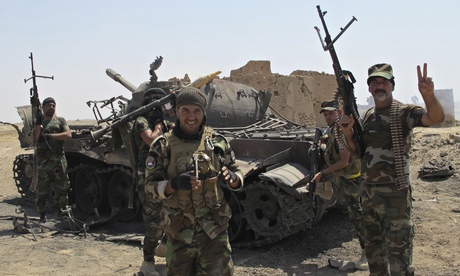Iraqi forces regain control of key road to Baghdad after breaking siege
Fighters make progress after breaking Isis hold on Amerli but relatives demand answers about fate of soldiers left behind
Iraqi Shia militia fighters celebrate breaking the siege of Amerli. Photograph: Reuters

Tuesday 2 September 2014
Iraqi forces have made further advances in their fightback against jihadis while hundreds of people have stormed parliament over the fate of missing soldiers who surrendered in June.
Having broken a months-long jihadi siege of the Shia Turkoman town of Amerli by Islamic State (Isis) fighters, troops on Tuesday regained control of part of a key highway linking Baghdad to the north.
Two towns north of Amerli were also taken from the jihadis on Monday as Iraqi forces – backed by US air strikes – scored their first major victories since the army's collapse across much of the north in June.
The collapse left some 1,700 soldiers in jihadi hands, with many believed to have been executed.
Demanding to know their fates, angry relatives stormed the parliament in Baghdad, attacked MPs and began a sit-in in its main chamber, an official said.
Riot police were trying to evict the protesters, who were also calling for some officers to be held accountable, said the official, who was there.
Concern over those in jihadi hands has been fuelled by reports of widespread atrocities, including accusations from Amnesty International of war crimes and ethnic cleansing.
Isis declared an Islamic caliphate in regions under its control in Iraq and Syria after it swept through much of the Sunni Arab heartland north of Baghdad in June and then stormed minority Christian and Yazidi Kurdish areas.
Isis has carried out beheadings, crucifixions and public stonings, and on Tuesday Amnesty accused it of "war crimes, including mass summary killings and abductions" in areas it controls.
"The massacres and abductions being carried out by Islamic State provide harrowing new evidence that a wave of ethnic cleansing against minorities is sweeping across northern Iraq," said its senior crisis response adviser, Donatella Rovera.
The UN Human Rights Council unanimously agreed to send an emergency mission to Iraq to investigate Isis atrocities, after a senior UN official said the jihadi group had carried out "acts of inhumanity on an unimaginable scale".
Concern over the scale of the humanitarian crisis helped prompt limited US air strikes in support of Iraqi forces, Shia militia and Kurdish troops battling the jihadis.
Such strikes were used in the area during the Amerli operation – the first time Washington has expanded its more than three-week air campaign against Isis outside the north.
Desperate residents rushed to receive aid deliveries after Iraqi forces moved into the town, scrambling to grab food and bottles of water from trucks.
A day after seizing Amerli, troops and Shia militiamen on Monday retook Sulaiman Bek and Yankaja, two towns to its north that had been important militant strongholds.
Army Staff Lieutenant General Abdulamir al-Zaidi said they had continued the advance on Tuesday, regaining control of a stretch of the main highway to the north which had been closed by the militants for almost three months.
A senior militia commander said it would be several days before the road reopened as sappers needed to clear it of mines and booby traps planted by the retreating militants.
The US said it launched four air strikes in the Amerli area, effectively supporting operations involving militia forces that previously fought against US troops in Iraq.
The government's reliance on Shia militiamen in this and other operations risks entrenching groups which themselves have a history of brutal sectarian killings.
David Petraeus, a former commander-in-chief of US-led forces in Iraq, has warned against the US becoming an "air force for Shia militias".
But worries over the rise of Isis seem to outweigh other concerns, with western leaders warning the group posed a security risk far outside the areas under its control.
Australia's prime minister, Tony Abbott, on Tuesday said that "extreme force" was justified against Isis militants, describing them as worse than Nazis or Communists.
"As soon as they've done something gruesome and ghastly and unspeakable, they're advertising it on the internet for all to see, which makes them, in my mind, nothing but a death cult," Abbott said.
Fiji, meanwhile, revealed that Al-Qaida-linked Syrian rebels who are holding 45 UN peacekeepers hostage in the Golan Heights are demanding they be expunged from a UN terror blacklist.
The Fijians, part of the UN Disengagement Observer Force (UNDOF), were captured last Wednesday when Al-Nusra Front rebels stormed a Golan Heights crossing.
Another group of 75 Philippine peacekeepers refused to surrender and eventually escaped from two camps on the Syrian side of the demarcation line after the rebels besieged them.
Fiji's army chief, Mosese Tikoitoga, said a UN team had arrived in the Golan Heights from New York to take over negotiations for their release.
"Unfortunately we have not made any improvement in the situation, our troops remain at an undisclosed location, the rebels are not telling us where they are," Tikoitoga said, adding that the hostage takers also want humanitarian aid for areas they control and compensation for wounded fighters.
